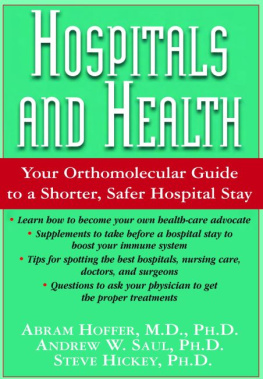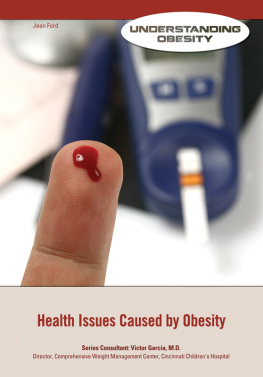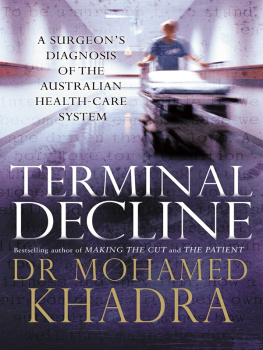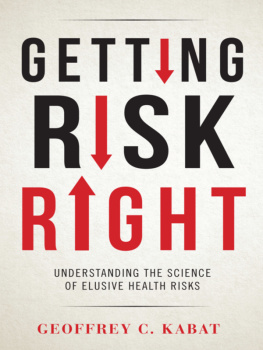Abram Hoffer MD PhD - Hospitals and Health
Here you can read online Abram Hoffer MD PhD - Hospitals and Health full text of the book (entire story) in english for free. Download pdf and epub, get meaning, cover and reviews about this ebook. year: 2010, publisher: Basic Health Publications, genre: Religion. Description of the work, (preface) as well as reviews are available. Best literature library LitArk.com created for fans of good reading and offers a wide selection of genres:
Romance novel
Science fiction
Adventure
Detective
Science
History
Home and family
Prose
Art
Politics
Computer
Non-fiction
Religion
Business
Children
Humor
Choose a favorite category and find really read worthwhile books. Enjoy immersion in the world of imagination, feel the emotions of the characters or learn something new for yourself, make an fascinating discovery.
- Book:Hospitals and Health
- Author:
- Publisher:Basic Health Publications
- Genre:
- Year:2010
- Rating:4 / 5
- Favourites:Add to favourites
- Your mark:
- 80
- 1
- 2
- 3
- 4
- 5
Hospitals and Health: summary, description and annotation
We offer to read an annotation, description, summary or preface (depends on what the author of the book "Hospitals and Health" wrote himself). If you haven't found the necessary information about the book — write in the comments, we will try to find it.
Learn how to exert control over your health decisions, steer clear of unnecessary risks, and increase the chances of success.
Hospitals and Health — read online for free the complete book (whole text) full work
Below is the text of the book, divided by pages. System saving the place of the last page read, allows you to conveniently read the book "Hospitals and Health" online for free, without having to search again every time where you left off. Put a bookmark, and you can go to the page where you finished reading at any time.
Font size:
Interval:
Bookmark:
Acknowledgments
After ninety-one years of a life very well lived, Dr. Abram Hoffer passed away while collaborating on this book. The co-authors continued with the project, editing and adding to Dr. Hoffers text to generate what we hope is an accurate representation of his work. We cannot thank him enough for his humanitarianism, mentoring, and friendship. Few, if any, researchers or practicing physicians have had more influence on modern nutritional medicine than Abram Hoffer. Indeed, Linus Pauling himself first introduced the term orthomolecular medicine as a result of reading Dr. Hoffers work. Our tribute to Dr. Hoffer is to publish this information.
We would like to thank the International Schizophrenia Foundation and its Executive Director Steven Carter for kind permission to use material that was first published in the Journal of Orthomolecular Medicine.
We would also like to thank Dr. Hilary Roberts for reading and making suggestions on an early version of the text.
APPENDIX
Your Hospital Checklists
You want to leave the hospital on foot from the front door, not in a box by way of the basement. Take great care in choosing a hospitalyour choice may save your life. In the United States, check out the Twelfth Annual HealthGrades Hospital Quality in America Study for the rating of your hospital. The HealthGrades Study analyzed approximately 40 million Medicare discharges for quality as 1 star (poor), 3 stars (reasonable), and 5 stars (best). They compared twenty-seven procedures and diagnoses. In the three years from 2006 through 2008, they found a small improvement in mortality. Over seventeen procedures and diagnoses where death rates were studied, there was on average a 72 percent lower chance of dying in a highly rated hospital compared to a poor hospital. Compared with the average hospital, 5-star hospitals had less than half the risk of dying.
The report suggested that, from 2006 to 2008, 224,537 lives would be saved on Medicare if all hospitals had 5-star performance for the seventeen treatments. Over half of the preventable deaths were associated with four conditions: sepsis, pneumonia, heart failure, and respiratory failure. Remember that these statistics are people, with parents, wives, husbands, and children. Each of these deaths is a tragedy.
The results for complications were similar. While in the hospital for orthopedic procedures, there was an 80 percent lower chance of one or more complications if the hospital was 5-star rated hospital compared to a 1-star. The good hospitals were also much safer than the average ones. There was a 61 percent lower chance of one or more complications when in a 5-star rated hospital compared to the U.S. average. If all hospitals were working as well as a 5-star rated hospital, Medicare patients would have had 110,687 fewer orthopedic complications. Remember, a more expensive hospital is not necessarily safer. You need to select your hospital carefully.
Core Requirements for a Hospital
There are some core requirements for an institution attempting to heal the sick. The patient needs shelter, food, and respect. Unless these needs are met, there is little hope for effective treatment. However, patients may improve and get better in spite of the detrimental effects of the hospital.
The first requirement is to provide shelter. The failure of modern medicine in this respect is illustrated by the psychiatric patients begging on our streets. The patient needs shelter until well enough to carry on with his or her life outside the hospital.
The second requirement is for good nutritious food, and hospitals almost always fail on this. While it is generally accepted that much of modern disease is related to a poor diet, hospitals provide a terrible example in the food they typically serve. Do not expect the food you receive on a cardiology ward to adhere to the nutritional research on how to avoid a heart attack. Even when hospitals try to provide good nutrition, they are prevented by the current dietary paradigm. The majority of dietitians and nutritionists in hospitals are badly trained in vitamin therapy. As a rule, they promote vitamins and minerals only to the extent condoned by government standards such as the Recommended Dietary Allowance (RDA). Nutrition is perceived as part of preventive medicine and thus ignored by organizations dedicated to treatment. Some patients have their families bring them their meals, prepared at home from natural, fresh, whole foodsthe classic grapes by the bedside. However, even an excellent diet does not provide sufficient nutrients to help heal serious illnesses. Supplements are essential.
The third factor is that patients need decency, respect, and optimism. Modern hospitals have much to learn from the Quaker model for mental hospitals. The Quaker approach arose in the eighteenth century and the treatment included:
- Harmonious situationbuilding and surroundings that lift the spirit
- Nutritionexceptional food standards
- Self-controlpatients rewarded for controlling their behavior
- A return to socialization
- Useful work
- Staff as role models
The power of these simple requirements to aid recovery from psychiatric disorders is illustrated by the results claimed for schizophrenia by Dr. Hoffer and current medicine. Practitioners of orthomolecular and nutritional medicine necessarily provide good food and respect for the individual patient. The core element in Dr. Hoffers treatment of schizophrenia was a very high intake of B vitamins, particularly niacin, and vitamin C. The reported recovery rates are shown in the table.
RECOVERY RATES FOR SCHIZOPHRENIA PATIENTS | |
TREATMENT/ORGANIZATION | RECOVERY RATES |
Mental hospital (1900 to 1950) | 0 percent response |
Modern psychiatry | Under 10 percent |
Dr. Hoffers orthomolecular treatment | 75-90 percent |
These figures are not directly challenged. When Dr. Hoffer reported them to colleagues, they suggested his excellent results were a result of his healing personality or self-delusion. Similarly, early critics of Dr. Hoffers therapeutic clams never accused him of lying; instead, they provided alternative explanations, such as it was his amazing persona that was so beneficial. Dr. Hoffer was always the first to admit he really did have a marvelous personality, but he never considered it that powerful.
On one occasion, Dr. Hickey suggested a massive dose of niacin and vitamin C to a patient having an acute and severe psychotic episode. The young man was waiting for an appointment for mainstream psychiatric help. The results were immediate and dramatic: the young man recovered overnight and, within two days, had returned to normal. When he went for his appointment with the psychiatric services, he did not need medication or additional help. Dr. Hickey e-mailed Dr. Hoffer to tell him the news and received this tongue-in-cheek reply: My critics never called me liar when I spoke about recoveries but they knew that it was due to my marvelous healing personality, as they also knew as a matter of fact that vitamins had absolutely nothing to do with schizophrenia. Now, we know that you too have that marvelous personality. Congratulations.
Here, we examine a number of factors you should look for in choosing a hospital and provide handy checklists to help your evaluation process.
BASIC CONSIDERATIONS
When choosing a hospital, there are a few basic considerations that may be helpful. Large hospitals and those connected to universities are more likely to have the equipment and expertise to cope in an emergency. However, take care with teaching hospitalsthey are in need of material for research and training, and being a guinea pig is a risk you might want to avoid. Check that the hospital appears clean and well organized. Poor hospitals often have a bad reputation and this will be reflected in the opinion of former patients and perhaps local news reports. Do an Internet search on the hospital. Remember, you are far more likely to suffer complications or die in a poor hospital.
Next pageFont size:
Interval:
Bookmark:
Similar books «Hospitals and Health»
Look at similar books to Hospitals and Health. We have selected literature similar in name and meaning in the hope of providing readers with more options to find new, interesting, not yet read works.
Discussion, reviews of the book Hospitals and Health and just readers' own opinions. Leave your comments, write what you think about the work, its meaning or the main characters. Specify what exactly you liked and what you didn't like, and why you think so.









